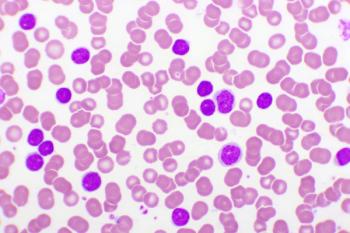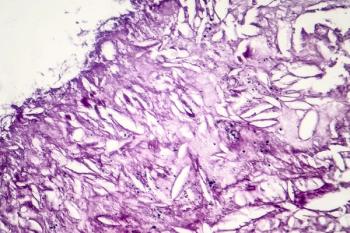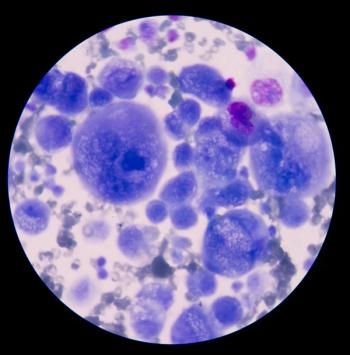
The Japanese approval of acalabrutinib for the treatment of patients with treatment-naïve chronic lymphocytic leukemia was supported by data from the phase 3 ELEVATE-TN trial.

Your AI-Trained Oncology Knowledge Connection!


The Japanese approval of acalabrutinib for the treatment of patients with treatment-naïve chronic lymphocytic leukemia was supported by data from the phase 3 ELEVATE-TN trial.

The decision to approve durvalumab plus tremelimumab in Japan for patients with advanced non–small cell lung cancer and unresectable biliary tract cancer and liver cancer was based on data from several phase 3 studies.

Olaparib in combination with abiraterone and prednisone or prednisolone alone has been approved as treatment for metastatic castration-resistant prostate cancer in the European Union.

Patients with HER2-positive advanced gastric or gastroesophageal junction adenocarcinoma in the European Union can now receive treatment with fam-trastuzumab deruxtecan-nxki following its approval.

Fam-trastuzumab deruxtecan-nxki has been recommended for approval by the European Union’s Committee for Medicinal Products for Human Use in patients with HER2-low advanced breast cancer.

177Lu vipivotide tetraxetan becomes first targeted radioligand treatment approved by the European Commission for prostate-specific membrane antigen–positive metastatic castration-resistant prostate cancer.

The marketing authorization application for oral momelotinib in myelofibrosis has been approved by the European Medicines Agency.

The European Commission’s approval of cemiplimab for recurrent or metastatic cervical cancer marks the first second-line immunotherapy option available for this patient population regardless of tumor histology.

The National Institute for Health and Care Excellence has given a positive opinion of mobocertinib as a treatment for previously treated advanced non-small cell lung cancer with EGFR exon 20 insertion mutations.

The European Commission based its approval of zanubrutinib for the management of chronic lymphocytic leukemia on data from the phase 3 SEQUOIA trial and the phase 3 ALPINE trial.

The European Commission based its approval of axicabtagene ciloleucel as a second-line therapy for patients with relapsed/refractory diffuse large B-cell lymphoma or high-grade B-cell lymphoma on the efficacy findings of the phase 3 ZUMA-7 trial.

Japan’s Ministry of Health, Labor and Welfare approved pembrolizumab for use in 4 indications, including high-risk, early-stage triple-negative breast cancer, stage IIB or IIC melanoma, adjuvant renal cell carcinoma, and recurrent/metastatic cervical cancer.

The European Commission based its approval of nivolumab/relatlimab for patients with a PD-L1 expression of less than 1% on the results of the phase 2/3 RELATIVITY-047 trial.

Olaparib and bevacizumab has been approved in China as a frontline maintenance treatment for patients with advanced homologous recombination deficiency–positive ovarian cancer based on results from the phase 3 PAOLA-1 trial.

Results from the phase 3 ASCEMBL trial led to the approval of asciminib by the European Commission for patients with Philadelphia chromosome–positive chronic myeloid leukemia in chronic phase.

The European Commission approved olaparib as monotherapy or in combination with endocrine therapy for patients with germline BRCA1/2-mutant, HER2-negative high-risk early breast cancer.

Patients with relapsed/refractory multiple myeloma appear to benefit from treatment with teclistamab, which was given a positive opinion by the European Medicines Agency’s Committee for Medicinal Products for Human Use.

Patients in Europe who have multiple myeloma and have received at least 1 previous therapy can now receive treatment with selinexor plus bortezomib and low-dose dexamethasone following its full marketing authorization by the European Commission.

European patients with unresectable or metastatic HER2-positive breast cancer are now able to receive treatment with trastuzumab deruxtecan following 1 or more previous anti-HER2 regimens.

The Committee for Medicinal Products for Human Use of the European Medicines Agency has recommended for approval trastuzumab deruxtecan for patients with unresectable or metastatic HER2-positive breast cancer.

Patients with fully resected stage IIB or IIC melanoma can now receive treatment with pembrolizumab in the adjuvant setting following its approval by the European Commission.

Based on results from the phase 2 GEOMETRY mono-1 trial, the European Commission has approved capmatinib for patients with non–small cell lung cancer who have MET exon 14 skipping mutations, and a need for systemic therapy following prior treatment with immunotherapy and/or platinum-based chemotherapy.

Results from the phase 3 AENA trial led to the United Kingdom’s Medicine and Healthcare products Regulatory Agency accepting a marketing authorization application for aumolertinib for review in patients with locally advanced or metastatic non–small cell lung cancer with activating EGFR mutations, and those with locally advanced or metastatic EGFR T790M mutation–positive non–small cell lung cancer.

Based on results of the phase 3 RATIONALE-309 trial, the China National Medical Products Administration has approved tislelizumab plus chemotherapy for the first-line treatment of recurrent or metastatic nasopharyngeal cancer.

Based on results from the phase 1/2 GO29781 trial, the European Commission has approved mosunetuzumab for adult patients with relapsed/refractory follicular lymphoma.

European patients with locally advanced or early-stage triple-negative breast cancer at high risk of recurrence can now receive treatment with neoadjuvant pembrolizumab and chemotherapy, as well as pembrolizumab monotherapy post surgery following its approval by the European Commission.

Final end point analysis of the GEMSTONE-301 trial confirmed that patients with stage III non–small cell lung cancer experienced significant clinical benefit and promising efficacy following consolidation therapy with sugemalimab monotherapy.

Pembrolizumab has been approved by the European Commission in 5 indications of solid tumors that are microsatellite instability–high or deficient mismatch repair.

Patients with persistent, recurrent or metastatic cervical cancer whose tumors express PD-L1 can receive treatment with pembrolizumab plus chemotherapy with or without bevacizumab following approval by the European Commission.

European patients with locally advanced or metastatic urothelial cancer can now receive treatment with enfortumab vedotin following treatment with a platinum-containing regimen and a PD-(L)1 inhibitor.